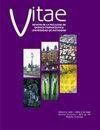通过酶解其淀粉和随后的乳酸发酵制备益生菌藜麦饮料
Q3 Pharmacology, Toxicology and Pharmaceutics
引用次数: 0
摘要
背景:近年来,人们对健康食品消费的关注有所增加。它们不仅符合基本的喂养功能,而且还提供健康益处。益生菌是功能性食品和饮料中的主要功能成分之一。它们提供许多健康益处,并因其代谢能力和对不同栖息地的适应性而脱颖而出。此外,藜麦种子含有大量的优质蛋白质和碳水化合物、蛋白质、脂肪、纤维和矿物质的营养价值,它们被认为是理想的膳食替代品。目的:本研究旨在详细阐述一种益生菌藜麦饮料,该饮料结合了从其种子中获得的淀粉的酶解作用和益生菌培养的乳酸发酵,寻求增强其营养特性并将其转化为功能性饮料。方法:为此,在三种不同浓度的益生菌培养物(接种量)中进行发酵:10%,5%,1%,以及其他三种不同的发酵时间:8,10和12小时。测量了pH、总可滴定酸度(以乳酸(%)表示)、还原糖和可溶性固体。之后,该饮料加入了蜂蜜、角豆、防腐剂和芒果调味剂。结果:统计分析表明,10%的益生菌培养和10小时的发酵达到最佳条件。微生物学分析证实在浓度为108 CFU/mL时存在益生菌微生物。近似分析表明,每100克饮料含有84.6 Kcal, 19.3 g碳水化合物和1.4 g蛋白质。结论:该益生菌藜麦饮料可以被认为是植物性食品,同时也是一种功能性饮料,因为它含有的益生菌培养物有助于维持肠道微生物群,预防慢性疾病的发生。本文章由计算机程序翻译,如有差异,请以英文原文为准。
Preparation of a probiotic quinoa beverage by enzymatic hydrolysis of its starches and subsequent lactic acid fermentation
BACKGROUND: The concern about consuming healthy foods has increased in recent years. Not only are they expected to comply with essential feeding functions, but they also provide health benefits. Probiotics are one of the main functional components expected to be present in functional foods and beverages. They provide many health benefits and stand out due to their metabolic capacities and adaptability to different habitats. In addition, Quinoa seeds contain valuable quantities of quality protein and nutritional values of carbohydrates, proteins, fats, fibers, and mineral substances for which they are considered an ideal dietary alternative.OBJECTIVES: This research aimed to elaborate on a probiotic quinoa beverage, which combines the effect of enzymatic hydrolysis of the starches obtained from its seeds with lactic acid fermentation using probiotic cultures, seeking to enhance its nutritional properties and converting it into a functional beverage.METHODS: For this, fermentations were carried out in three different concentrations of probiotic cultures (inoculum): 10%, 5%, 1%, and three other different fermentation times: 8, 10, and 12 hours. pH, Total titrable acidity expressed as lactic acid (%), reducing sugars, and soluble solids were measured. After that, the beverage was formulated with honey, carob, preservatives, and mango flavoring. RESULTS: Statistical analysis indicated optimal conditions were achieved with 10% probiotic cultures and 10 hours of fermentation. The microbiological analysis confirmed the presence of probiotic microorganisms at a concentration of 108 CFU/mL. Proximal analysis indicated that the composition contained 84.6 Kcal, 19.3 g of carbohydrates, and 1.4 g of protein per 100 g of beverage. CONCLUSIONS: The probiotic quinoa beverage was produced and can be considered in the group of plant-based foods, as well as a functional beverage, since the probiotic cultures it contains contribute to maintaining the intestinal microbiota and prevent the onset of chronic diseases.
求助全文
通过发布文献求助,成功后即可免费获取论文全文。
去求助
来源期刊

Vitae
PHARMACOLOGY & PHARMACY-
CiteScore
1.20
自引率
0.00%
发文量
0
审稿时长
>12 weeks
期刊介绍:
The journal VITAE is the four-monthly official publication of the School of Pharmaceutical and Food Sciences, and its mission is the diffusion of the scientific and investigative knowledge in the various fields of pharmaceutical and food research, and their related industries. The Journal VITAE is an open-access journal that publishes original and unpublished manuscripts, which are selected by the Editorial Board and then peer-reviewed. The editorial pages express the opinion of the Faculty regarding the various topics of interest. The judgments, opinions, and points of view expressed in the published articles are the responsibility of their authors.
 求助内容:
求助内容: 应助结果提醒方式:
应助结果提醒方式:


